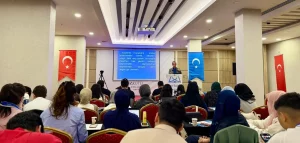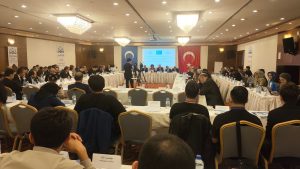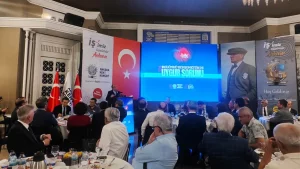In East Turkistan, during Ramadan, Uyghurs are ordered to film themselves eating at noon and submit the videos to authorities, in addition to threat meetings, home inspections, and mass banquets aimed at preventing fasting.
On Douyin, China’s social media platform, a video surfaced showing a resident in Payzavat County, Kashgar, filming themselves eating lunch and sending it to authorities. During phone interviews conducted by Radio Free Asia (RFA) journalists, it became clear that this was not an isolated incident but rather part of a series of restrictions and measures implemented in Payzavat during Ramadan. Residents are being forced to prove that they are not fasting.
While Ramadan carries deeply positive meanings for Muslims worldwide, for Uyghurs, it is a nightmare—a time when repression, surveillance, and detentions reach their peak, and fear, anxiety, and longing are felt most intensely.
For years, Chinese authorities have employed various methods to prevent people from fasting, such as organizing meetings with threats, distributing official notices, conducting daytime home inspections, and increasing night-time surveillance. Additionally, they have kept restaurants open in markets, distributed food and beverages through institutions and communities, and organized mass banquets. However, reports indicate that unsatisfied with these measures, officials have now gone further by forcing people in certain regions to submit evidence proving they are not fasting.
To obtain more information about these restrictions, RFA journalists contacted relevant institutions and authorities in the Uyghur region. An official from the State Security Unit of the Kucha County Police Department confirmed that fasting is banned this year, just as it has been in previous years.
According to a post shared on Douyin last week, a resident of Payzavat filmed themselves eating lunch and sent the video to authorities, stating that they would continue to submit such videos throughout the month.
A police officer in Payzavat, who agreed to speak by phone, emphasized that the local population is strictly prohibited from fasting. Another official in Payzavat, who wished to remain anonymous, revealed that sending video evidence to prove one is not fasting has become a widespread practice in the county. Although official documents and notices from higher authorities do not explicitly mention such a measure, local officials have demanded that residents submit videos of themselves eating at noon as the most effective way to prove that no one in their area is fasting.
Some officials have reportedly called individuals directly, instructing them to show themselves eating live over the phone. The same source stated that there have been cases in camps and prisons where detainees were punished for fasting, which is why locals do not reject these demands from the authorities.
Police officials in Payzavat acknowledged the existence of such a system. One officer confirmed that the practice is also being enforced in the villages of Gülbağ, Bayavat, and Terim. Another official working in Mişa village stated that mass banquets and music events were being organized to make those secretly fasting break their fast, and that the requirement to submit video evidence proving one is not fasting is being implemented there as well.









Be First to Comment